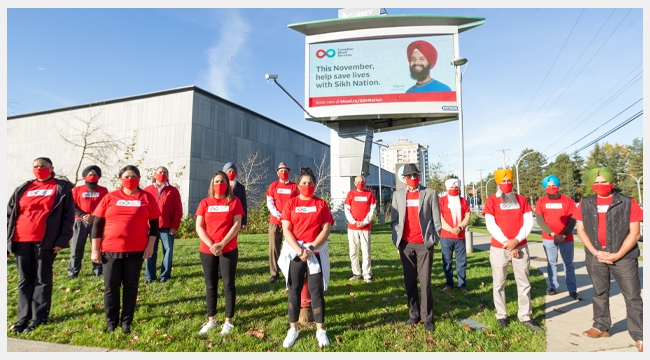Medication made from plasma donations helps fight bleeding disorder
Without immune globulin, Brandon Cotesta could have died at age 12
A teenage boy and his family in Sudbury, Ont. are so grateful to plasma donors for their role in treating a life-threatening bleeding disorder.
Brandon Cotesta was a sports-loving 12-year-old when he developed troubling symptoms during the winter school break in 2018. At first, he just seemed tired and under the weather, says his mother, Louise Sullivan. But then he developed spots all over his legs and belly.
As a nurse, Louise recognized those spots as petechiae, and knew they were a potential sign of some serious illnesses, including leukemia. So on Boxing Day, Brandon’s parents decided to have him checked out at the emergency department of the local hospital.
“He developed a nosebleed while we were there that they couldn’t stop for 48 hours,” says Louise. “And those spots that he had on his legs were a telltale symptom of the immune thrombocytopenia, so that’s how he got diagnosed.”
Bloodwork confirmed that diagnosis of immune thrombocytopenia (ITP), a condition formerly known as idiopathic thrombocytopenic purpura. It is a disease in which blood doesn’t clot because of an unusually low level of the blood component known as platelets. Patients whose blood doesn’t clot properly are at risk of severe bleeding.
Fortunately, doctors were able to treat Brandon with immune globulin. It’s a medication made from protein found in plasma, a straw-coloured component of blood. This protein and others in plasma are the key ingredient in manufacturing powerful therapies for a growing number of conditions, including Brandon’s.
“Without it, we don’t know what we would have done, because he was actively bleeding at the time and they couldn’t stop it,” says Louise.
While some conditions require lifelong treatment with immune globulin, Brandon has not required additional doses since that frightening episode in hospital two years ago. He does still need to have his blood tested regularly and because he bruises easily, he needs to take care to avoid injury.
“I can still go out and play sports. I just have to be a little less rough than I was before,” says Brandon, whose favourite sport is basketball.
Louise continues to be immensely reassured by the knowledge that in another emergency, Brandon would have access to immune globulin.
“It’s kind of like a little safety net almost,” says Louise. “Knowing that if Brandon ever goes through that again, it will be O.K., because that supply will be there for him.”
Find out where to donate plasma
Recovered from COVID-19? Consider donating plasma for clinical trials to help other patients
Increasing need for plasma donors
To help patients such as Brandon, Canadian Blood Services relies on plasma donors. Plasma is collected through a process that returns other blood components to the body during the donation process. It is also extracted from donations of whole blood.
Footage for this 2019 video about plasma donation was collected prior to the COVID-19 pandemic.
Plasma collected from donors is used for transfusion as well as to manufacture medications including immune globulin. To meet rapidly increasing demand for those medications, Canadian Blood Services is opening new plasma donor centres. The first of these new centres opened in Brandon’s hometown of Sudbury in August 2020. A centre in Lethbridge, Alta. is opening in December 2020 followed by another in Kelowna, B.C. in 2021.
Securing Canada’s supply of plasma
Inspiring plasma donors from 3,000 metres up
Plasma donors have tremendous power to help patients and many find it very rewarding. Because they are typically eligible to donate frequently, they often build relationships with donor centre staff and even other regular donors.
Since the Sudbury plasma donor centre opened, Louise has become a donor herself, along with her husband and other family members.
“I get teary every time I donate, because I just think of what it did for my son, and what I could maybe be doing for somebody else’s child or loved one,” says Louise.
Brandon has a simple message for donors as well.
“I’d say thank you to them, and that they are helping a lot of people that they don’t even realize they’re helping.”
Plasma donors help patients with immune thrombocytopenia (ITP) and many other disorders. The donations are used to manufacture immune globulin and other lifesaving medications. To book an appointment at a Canadian Blood Services donor centre, visit blood.ca/donate, download the GiveBlood app or call 1 888 2 DONATE.



